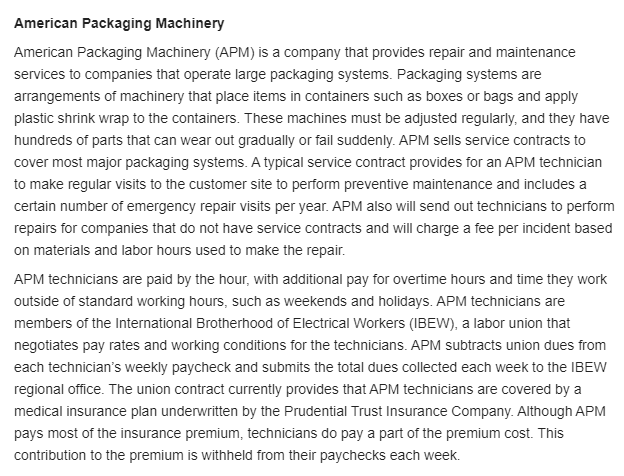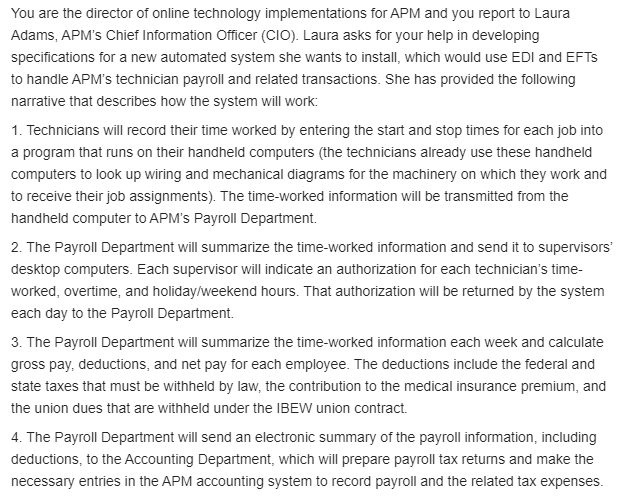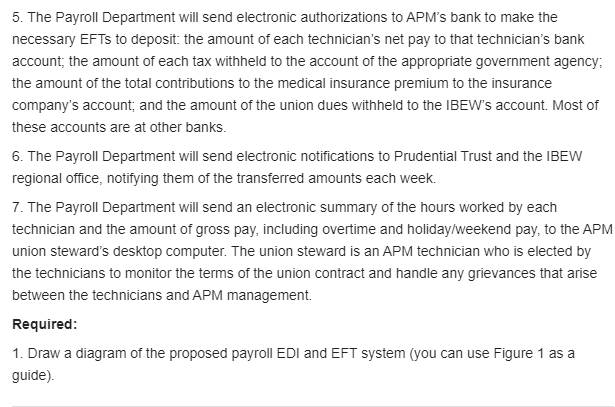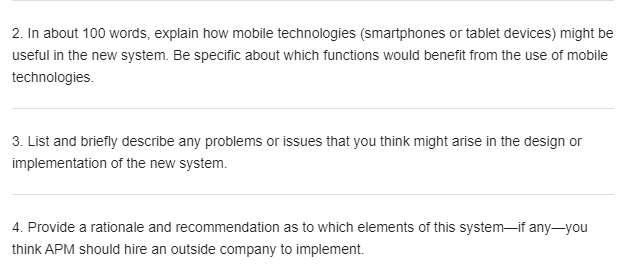Answered step by step
Verified Expert Solution
Question
1 Approved Answer
Hello may i please have the solution for Chapter 5 Problem 2C. In the book: Electronic Commerce 11th Edition . by Gary Schneider (Author). American




Hello may i please have the solution for Chapter 5 Problem 2C. In the book:
Electronic Commerce 11th Edition. by Gary Schneider (Author).
American Packaging Machinery American Packaging Machinery (APM) is a company that provides repair and maintenance services to companies that operate large packaging systems. Packaging systems are arrangements of machinery that place items in containers such as boxes or bags and apply plastic shrink wrap to the containers. These machines must be adjusted regularly, and they have hundreds of parts that can wear out gradually or fail suddenly. APM sells service contracts to cover most major packaging systems. A typical service contract provides for an APM technician to make regular visits to the customer site to perform preventive maintenance and includes a certain number of emergency repair visits per year. APM also will send out technicians to perform repairs for companies that do not have service contracts and will charge a fee per incident based on materials and labor hours used to make the repair. APM technicians are paid by the hour, with additional pay for overtime hours and time they work outside of standard working hours, such as weekends and holidays. APM technicians are members of the International Brotherhood of Electrical Workers (IBEW), a labor union that negotiates pay rates and working conditions for the technicians. APM subtracts union dues from each technician's weekly paycheck and submits the total dues collected each week to the IBEW regional office. The union contract currently provides that APM technicians are covered by a medical insurance plan underwritten by the Prudential Trust Insurance Company. Although APM pays most of the insurance premium, technicians do pay a part of the premium cost. This contribution to the premium is withheld from their paychecks each week. You are the director of online technology implementations for APM and you report to Laura Adams, APM's Chief Information Officer (CIO). Laura asks for your help in developing specifications for a new automated system she wants to install, which would use EDI and EFTS to handle APM's technician payroll and related transactions. She has provided the following narrative that describes how the system will work: 1. Technicians will record their time worked by entering the start and stop times for each job into a program that runs on their handheld computers (the technicians already use these handheld computers to look up wiring and mechanical diagrams for the machinery on which they work and to receive their job assignments). The time-worked information will be transmitted from the handheld computer to APM's Payroll Department. 2. The Payroll Department will summarize the time-worked information and send it to supervisors' desktop computers. Each supervisor will indicate an authorization for each technician's time- worked, overtime, and holiday/weekend hours. That authorization will be returned by the system each day to the Payroll Department. 3. The Payroll Department will summarize the time-worked information each week and calculate gross pay, deductions, and net pay for each employee. The deductions include the federal and state taxes that must be withheld by law, the contribution to the medical insurance premium, and the union dues that are withheld under the IBEW union contract. The Payroll Department will send an electronic summary of the payroll information, including deductions, to the Accounting Department, which will prepare payroll tax returns and make the necessary entries in the APM accounting system to record payroll and the related tax expenses. 5. The Payroll Department will send electronic authorizations to APM's bank to make the necessary EFTs to deposit: the amount of each technician's net pay to that technician's bank account, the amount of each tax withheld to the account of the appropriate government agency; the amount of the total contributions to the medical insurance premium to the insurance company's account, and the amount of the union dues withheld to the IBEW's account. Most of these accounts are at other banks. 6. The Payroll Department will send electronic notifications to Prudential Trust and the IBEW regional Office, notifying them of the transferred amounts each week. 7. The Payroll Department will send an electronic summary of the hours worked by each technician and the amount of gross pay, including overtime and holiday/weekend pay, to the APM union steward's desktop computer. The union steward is an APM technician who is elected by the technicians to monitor the terms of the union contract and handle any grievances that arise between the technicians and APM management. Required: 1. Draw a diagram of the proposed payroll EDI and EFT system (you can use Figure 1 as a guide). 2. In about 100 words, explain how mobile technologies (smartphones or tablet devices) might be useful in the new system. Be specific about which functions would benefit from the use of mobile technologies. 3. List and briefly describe any problems or issues that you think might arise in the design or implementation of the new system. 4. Provide a rationale and recommendation as to which elements of this systemif anyyou think APM should hire an outside company to implement. American Packaging Machinery American Packaging Machinery (APM) is a company that provides repair and maintenance services to companies that operate large packaging systems. Packaging systems are arrangements of machinery that place items in containers such as boxes or bags and apply plastic shrink wrap to the containers. These machines must be adjusted regularly, and they have hundreds of parts that can wear out gradually or fail suddenly. APM sells service contracts to cover most major packaging systems. A typical service contract provides for an APM technician to make regular visits to the customer site to perform preventive maintenance and includes a certain number of emergency repair visits per year. APM also will send out technicians to perform repairs for companies that do not have service contracts and will charge a fee per incident based on materials and labor hours used to make the repair. APM technicians are paid by the hour, with additional pay for overtime hours and time they work outside of standard working hours, such as weekends and holidays. APM technicians are members of the International Brotherhood of Electrical Workers (IBEW), a labor union that negotiates pay rates and working conditions for the technicians. APM subtracts union dues from each technician's weekly paycheck and submits the total dues collected each week to the IBEW regional office. The union contract currently provides that APM technicians are covered by a medical insurance plan underwritten by the Prudential Trust Insurance Company. Although APM pays most of the insurance premium, technicians do pay a part of the premium cost. This contribution to the premium is withheld from their paychecks each week. You are the director of online technology implementations for APM and you report to Laura Adams, APM's Chief Information Officer (CIO). Laura asks for your help in developing specifications for a new automated system she wants to install, which would use EDI and EFTS to handle APM's technician payroll and related transactions. She has provided the following narrative that describes how the system will work: 1. Technicians will record their time worked by entering the start and stop times for each job into a program that runs on their handheld computers (the technicians already use these handheld computers to look up wiring and mechanical diagrams for the machinery on which they work and to receive their job assignments). The time-worked information will be transmitted from the handheld computer to APM's Payroll Department. 2. The Payroll Department will summarize the time-worked information and send it to supervisors' desktop computers. Each supervisor will indicate an authorization for each technician's time- worked, overtime, and holiday/weekend hours. That authorization will be returned by the system each day to the Payroll Department. 3. The Payroll Department will summarize the time-worked information each week and calculate gross pay, deductions, and net pay for each employee. The deductions include the federal and state taxes that must be withheld by law, the contribution to the medical insurance premium, and the union dues that are withheld under the IBEW union contract. The Payroll Department will send an electronic summary of the payroll information, including deductions, to the Accounting Department, which will prepare payroll tax returns and make the necessary entries in the APM accounting system to record payroll and the related tax expenses. 5. The Payroll Department will send electronic authorizations to APM's bank to make the necessary EFTs to deposit: the amount of each technician's net pay to that technician's bank account, the amount of each tax withheld to the account of the appropriate government agency; the amount of the total contributions to the medical insurance premium to the insurance company's account, and the amount of the union dues withheld to the IBEW's account. Most of these accounts are at other banks. 6. The Payroll Department will send electronic notifications to Prudential Trust and the IBEW regional Office, notifying them of the transferred amounts each week. 7. The Payroll Department will send an electronic summary of the hours worked by each technician and the amount of gross pay, including overtime and holiday/weekend pay, to the APM union steward's desktop computer. The union steward is an APM technician who is elected by the technicians to monitor the terms of the union contract and handle any grievances that arise between the technicians and APM management. Required: 1. Draw a diagram of the proposed payroll EDI and EFT system (you can use Figure 1 as a guide). 2. In about 100 words, explain how mobile technologies (smartphones or tablet devices) might be useful in the new system. Be specific about which functions would benefit from the use of mobile technologies. 3. List and briefly describe any problems or issues that you think might arise in the design or implementation of the new system. 4. Provide a rationale and recommendation as to which elements of this systemif anyyou think APM should hire an outside company to implementStep by Step Solution
There are 3 Steps involved in it
Step: 1

Get Instant Access to Expert-Tailored Solutions
See step-by-step solutions with expert insights and AI powered tools for academic success
Step: 2

Step: 3

Ace Your Homework with AI
Get the answers you need in no time with our AI-driven, step-by-step assistance
Get Started


